German Business Sentiment Drops - Ifo
Sentiment among German businesses fell in April, according to a closely watched survey, with economists raising questions whether the eurozone's biggest economy is slowing down.
The Ifo Institute's business climate gauge slipped to 102.1 in April from 103.3 in March, recording the fifth straight month of declines.
Economists said the results pointed to a mixed picture for the German economy, a key pillar of the euro zone's economic health.
Deteriorating sentiment was seen in both the manufacturing and services sectors, with the index integrating the latter sector for the first time this month.
Clemens Fuest, president of the Ifo Institute, said that the numbers were disappointing and pointed to a number of challenges for the German economy. Fuest said that the index showed a "cooling down" rather than a "slowing down" in the economy and a degree of "normalization." "It's possible we've seen the peak of the upswing," he added.
Ifo's gauge underwent a significant revamp in April. The large German services sector was added to the main index, which previously focused on industries like manufacturing and construction, and the base year was swapped from 2005 to 2015.
The changes in methodology affect the levels of the index. The March reading, for instance, was changed from 114.7. Ifo noted when it announced its decision that the lower reading “is purely a base-year effect and not a plunge in the business cycle.”
Still, the decline in April highlights how the eurozone's biggest economy has got off to a bumpy start this year after a sharp acceleration in 2017.
Prime News are provided byInstaForex.
Please visit our sponsors
Results 1,971 to 1,980 of 3458
Thread: Forex News from InstaForex
-
25-04-2018, 03:34 AM #1971

-
25-04-2018, 05:46 AM #1972

South Korea Consumer Confidence Weakens Further

South Korea's consumer confidence weakened for the fifth successive month in April, survey data from Bank of Korea showed Wednesday.
The consumer sentiment index fell to 107.1 in April from 108.1 in March.
Consumer sentiments regarding current living standards and their future outlook remained the same as in March, at 95 and 102 respectively. Consumer sentiment as to future household income and spending were dropped marginally in April.
The expected inflation rate over the following year was 2.6 percent.
The survey was conducted among 2,200 households between April 10 and 17.
News are provided byInstaForex.
-
26-04-2018, 03:26 AM #1973

Wall Street Closed Mostly Higher as Boeing Lifts Dow
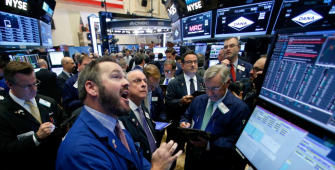
U.S. stocks advanced on Wednesday as the Dow Jones industrial average ended higher for the first time in six sessions, rebounding from sharp losses seen earlier in the day, as Boeing jumped on solid earnings.
Boeing climbed 4.2 percent after posting quarterly results that easily surpassed analyst expectations. The stock's rise helped the Dow rebound from a 201.05-point deficit and snap a five-day losing streak. The Dow closed at 24,083.83, up 59.70 points.
The S&P 500 also pared earlier losses, closing 0.2 percent higher at 2,639.40. The Nasdaq composite fell 0.1 percent to 7,003.74.
All three major U.S. indexes fluctuated in choppy trading and the Dow flirted with its sixth consecutive decline during much of the session, which would continue its longest losing streak since an 8-day slide in March 2017.
Twitter posted stronger-than-forecast earnings on Wednesday, but the stock dropped 2.4 percent. Comcast, NBCUniversal's parent company, also released better-than-expected earnings Wednesday.
Facebook was up slightly ahead of its earnings, expected after the bell. The social media company has recently come under fire over its use of consumer data.
Comcast was up 2.1 percent after the largest U.S.cable company confirmed its $31 billion bid for Sky on the heels of its better-than-expected earnings report.
So far, 31 percent of S&P 500 companies have posted earnings, 81.2 percent of which came in above consensus estimates. Analysts now expect first-quarter earnings growth of 22 percent, according to Thomson Reuters data.
Of the 11 major S&P 500 sector indexes, 7 were in negative territory, led by Real Estate, Technology and Financials.
The CBOE Volatility index .VIX , an indicator of short-term stock market volatility, jumped to 18.67 points, its highest level in more than a week.
Prime News are provided byInstaForex.
-
26-04-2018, 05:41 AM #1974

Australia Q1 Import Prices Rise More Than Expected

Australia's import prices increased at a faster-than-expected pace in the three months ended March, figures from the Australian Bureau of Statistics showed Thursday.
The import price index climbed 2.1 percent sequentially in the first quarter, following a 2.0 percent slight rise in the fourth quarter of 2017. It was the second consecutive quarterly increase.
That was above the 1.2 percent rise economists had forecast. The increase was driven by higher prices paid for petroleum, petroleum products and related materials, road vehicles, inorganic chemicals and plastics in primary forms.
On a yearly basis, imports prices grew at a faster rate of 2.3 percent in the March quarter, after a 1.4 percent gain in the December quarter.
Data also revealed that export prices rose 4.9 percent quarterly in the first quarter, following a 2.8 increase in the prior month. As compared to the corresponding period last year, the index dropped by 1.4 percent.
News are provided byInstaForex.
-
27-04-2018, 03:41 AM #1975

Japan Industrial Production Jumps 1.2% In March

Industrial output in Japan gained 1.2 percent on month in March, the Ministry of Economy, Trade and Industry said on Friday.
That topped forecasts for an increase of 0.5 percent following the 2.0 percent gain in February.
On a yearly basis, industrial production jumped 2.2 percent - exceeding forecasts for 2.0 percent and up from 1.6 percent in the previous month.
Upon the release of the data, the METI maintained its assessment of industrial production, saying that it is picking up slowly. Also on Friday: .
Retail sales in Japan were down a seasonally adjusted 0.7 percent on month in March, the Ministry of Economy, Trade and Industry said.
That was shy of forecasts for a flat reading following the 0.5 percent increase in February.
On a yearly basis, retail sales gained 1.0 percent - also missing forecasts for 1.5 percent and down from 1.7 percent in the previous month.
Large retailer sales added 0.1 percent on year, missing expectations for 0.8 percent and down from 0.6 percent a month earlier. .
The unemployment rate in Japan came in at a seasonally adjusted 2.5 percent in March, the Ministry of Internal Affairs and Communications said - in line with expectations and unchanged from the previous month.
The job-to-applicant ratio was 1.59 - also matching forecasts and up from 1.58 in February. The participation rate was 61.2 percent.
The number of employed persons in March was 66.20 million, an increase of 1.87 million or 2.9 percent on year. .
Consumer prices in Tokyo were up 0.5 percent on year in April, the Ministry of Internal Affairs and Communications said. That was well shy of forecasts for 0.8 percent and down from 1.0 percent in March.
Core CPI, which excludes volatile food prices, was up an annual 0.6 percent. That also missed forecasts for 0.8 percent, which would have been unchanged.
On a monthly basis, overall Tokyo CPI fell 0.4 percent and core inflation eased 0.1 percent.
News are provided byInstaForex.
-
27-04-2018, 04:56 AM #1976

U.S. Business Investment Cools; Labor Market Remains Strong
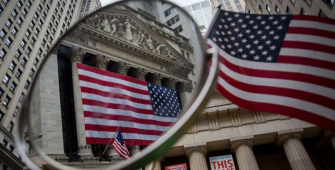
New orders for key U.S.-made capital goods dropped in March, pulled down by the biggest decline in demand for machinery in almost two years, and a fall in shipments implies that business spending on equipment cooled in the first quarter.
Separate data recently showed that the economy remains strong. The number of Americans filing for unemployment benefits dropped to the lowest level in over 48 years last week and the goods trade deficit narrowed sharply in March amid strong export growth.
According to the Commerce Department, orders for nondefense capital goods excluding aircraft, a closely watched proxy for business spending plans, fell 0.1 percent in March. Data for February was revised to show these so-called core capital goods rising 0.9 percent instead of the initially posted 1.4 percent jump.
In March, orders for machinery dropped 1.7 percent, the biggest decline since April 2016, after a gain of 0.3 percent in February. There were, however, increases in orders of primary metals, computers and electronic products, fabricated metals and electrical equipment, appliances and components.
Overall orders for durable goods, items ranging from toasters to aircraft that are meant to last three years or more, rose 2.6 percent in March as demand for transportation equipment rose 7.6 percent. That followed a 3.5 percent surge in durable goods orders in February.
Business spending on equipment likely cooled in the first quarter after double-digit growth in the second half of 2017. The moderation in investment in equipment is expected to have combined with a sharp slowdown in consumer spending to restrain economic growth in the first quarter.
Gross domestic product is likely to come in at 2 percent or less in the first quarter.
Nonetheless, signs are emerging that growth is likely to speed up in the spring, with GDP perhaps returns close to 3%. Companies are raising production and hiring at a rapid clip despite the lowest jobless rate since 2000. The rate of layoffs in April fell to the lowest level since 1969.
Prime News are provided byInstaForex.
-
02-05-2018, 04:59 AM #1977

Bitcoin Starts May with Slide Below $9,000
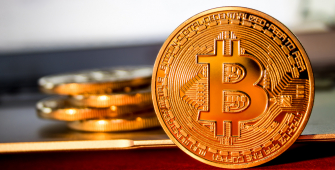
The cryptocurrency traded 3.9 percent lower at around $8, 880. The decline came after an increase of around 33.5 percent for April. There was no immediately apparent reason for bitcoin's decline, which started overnight. Bitcoin has struggled to climb back to $10, 000 in the last several weeks and continues to be almost 36 lower for the year.
Japanese yen represented around 41 percent to bitcoin trading volume, according to CryptoCompare. U.S. dollar-bitcoin trading accounted for around 25 percent and ether represented around 20 percent of trading volume.
Prime News are provided byInstaForex.
-
03-05-2018, 05:11 AM #1978

Eurozone Economy Slowed in the 1st Quarter

The eurozone economy slowed in the first three months of 2018, heightening fears the currency union's post-crisis recovery is petering out.
Data from Eurostat showed a sharp slowing in economic activity. Having surpassed all expectations in 2017, the growth rate of the EU's currency area dropped to just 0.4 percent during the first three months of 2018, down from 0.7 percent for the final quarter of 2017.
On a year-on-year basis, the eurozone's GDP growth slowed from a rate of 2.8 percent to 2.5 percent.
The last time the region's growth was this slow was in the summer of 2016, returning the eurozone to its post-crisis state of nervousness over whether it could sustain healthy growth rates for a long period.
Measures of output in industry and construction, as well as figures for retail sales, had recently pointed toward slower growth.
Economists believe that an unusually cold and snowbound March in Northern Europe had some impact on growth, as did strikes in Germany and France. There was no breakdown yet from Eurostat on what caused the slowdown.
European Central Bank president Mario Draghi said last week that the bank would watch the data in the months ahead with “caution”. Draghi stressed, however, that policymakers remained optimistic that the region's economy would stay strong enough to support a rise in inflation closer to the ECB's goal of less than 2 percent.
Uncertainty about the economy is likely to weigh on the ECB's next big decision over when and how to end its bond-buying stimulus program.
Prime News are provided byInstaForex.
-
08-05-2018, 05:29 AM #1979

Nestle, Starbucks Ink $7.15 billion Coffee Licensing Tie-Up
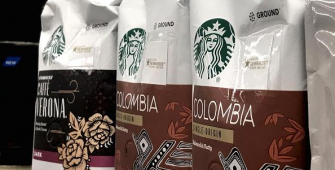
Nestle, the world's biggest food and beverage firm, has struck $71.5 billion cash deal with Starbucks Corp. for exclusive rights to sell the coffee chain's packaged coffees and teas globally.
The deal announced on Monday could boost Starbucks' business selling packaged Starbucks coffee, Teavana tea and other products via grocery stores and other retailers.
The partnership, which quantifies to a licensing deal, makes it possible for Starbucks to focus on enhancing its mainstay U.S. cafe business, where traffic growth has flattened amid competition from fast-food chains and upscale coffee houses, while rapidly expanding shops in China.
Starbucks will use the money raised from the deal to boost planned stock buybacks to $20 billion from $15 billion through fiscal 2020. It said the agreement would add to earnings per share by 2021.
The agreement also includes Starbucks-branded capsules for Nestle's Nespresso and Dolce Gusto single-serve brewers, which should help Nestle limit sales of alternatives from other providers.
Nestle anticipates the partnership will add to its earnings by 2019. It did not announce changes to its buyback plans.
Aside from cash payment, Starbucks will get revenue from product sales and royalties.
Prime News are provided byInstaForex.
-
09-05-2018, 03:25 AM #1980

Trump Withdraws US from Iran Nuclear Deal, Renews Sanctions
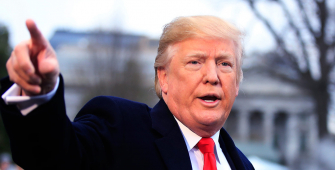
President Donald Trump on Tuesday pulled the United States out of an international nuclear deal with Iran, raising the risk of conflict in the Middle East, upsetting European allies and casting uncertainty over global oil supplies.
Trump said in a televised address from the White House that he would reimpose U.S. economic sanctions on Iran to undermine “a horrible one-sided deal that should have never, ever been made."
The United States will now reinstate all the sanctions it had waived as part of the nuclear accord, and it will impose additional economic penalties that are now being drawn up by the Treasury Department. Treasury Secretary Steven Mnuchin declined to specify what additional sanctions the United States might impose, but he expressed confidence that they would still be powerful even if other American allies did not follow suit.
The US president's decision intensifies the strain on the trans-Atlantic alliance, especially after European leaders made trips to Washington and repeatedly appealed to Trump to preserve the deal.
The leaders of Britain, Germany and France, which were signatories to the deal along with China and Russia, said in a joint statement that Trump's decision was a cause for “regret and concern."
The response from Iran itself, however, was muted. President Hassan Rouhani said he believed the agreement could still survive – but warned that he had instructed the country's atomic energy agency to prepare to restart uranium enrichment should the deal collapse completely.
Rouhani said Iran would remain committed to the deal agreed in 2015 between Iran and the US, UK, France, Germany, Russia and China.
Prime News are provided byInstaForex.
-
Sponsored Links
Thread Information
Users Browsing this Thread
There are currently 16 users browsing this thread. (0 members and 16 guests)
24 Hour Gold
Advertising
- Over 20.000 UNIQUE Daily!
- Get Maximum Exposure For Your Site!
- Get QUALITY Converting Traffic!
- Advertise Here Today!
Out Of Billions Of Website's Online.
Members Are Online From.
- Get Maximum Exposure For Your Site!
- Get QUALITY Converting Traffic!
- Advertise Here Today!
Out Of Billions Of Website's Online.
Members Are Online From.






 LinkBack URL
LinkBack URL About LinkBacks
About LinkBacks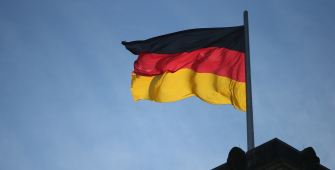





 Reply With Quote
Reply With Quote

